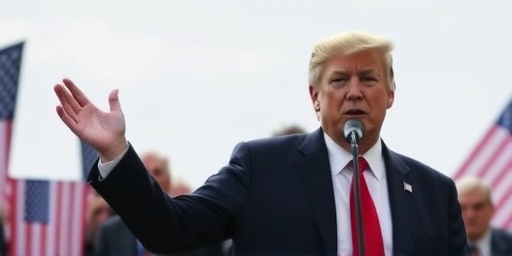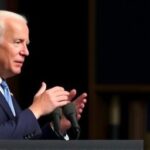In a thunderous post-election speech that electrified his base and sent shockwaves through the nation’s capital, President-elect Donald Trump declared war on what he called his ‘political enemies,’ vowing swift retaliation against those who he believes undermined his campaign and the will of the American people. Delivered on the steps of his Mar-a-Lago estate in Palm Beach, Florida, the address came just days after Trump‘s decisive victory in the 2024 presidential race, where he secured 312 electoral votes to his opponent’s 226. With a crowd of thousands chanting ‘Lock them up!’ Trump promised to ‘drain the swamp once and for all,’ targeting prosecutors, media figures, and former officials he accused of orchestrating ‘witch hunts’ against him.
- Trump’s Unfiltered Attacks: Dissecting the Election Speech Highlights
- Critics Sound Alarm: Fears of Authoritarian Overreach Grip Washington
- Supporters Rally: Why Trump’s Bold Stance Resonates with the Base
- Legal and Historical Echoes: Precedents for Political Retaliation in U.S. Politics
- Path Forward: What Trump’s Retaliation Vows Mean for Governance and 2025
The speech, lasting over 45 minutes, was a masterclass in populist fervor, blending gratitude for his supporters with pointed accusations. Trump specifically named Special Counsel Jack Smith, whom he labeled a ‘partisan hack,’ and vowed that under his administration, such figures would face ‘the full weight of justice.’ This unfiltered rhetoric has already polarized the political landscape, with Democrats decrying it as a blueprint for authoritarianism and Republicans hailing it as a necessary reckoning.
Trump’s Unfiltered Attacks: Dissecting the Election Speech Highlights
From the outset, Trump’s election speech was a barrage of grievances and promises, setting the tone for what many fear could be a vengeful second term. Standing under a massive American flag, the president-elect wasted no time in invoking the theme of retaliation. ‘For years, they’ve come after me, my family, and you—the forgotten men and women of America,’ Trump boomed, his voice echoing across the sun-drenched grounds. He recounted alleged injustices, from the FBI’s Mar-a-Lago raid in 2022 to the multiple indictments that dogged his campaign, framing them as coordinated assaults by deep-state operatives.
Key moments in the speech underscored Trump’s intent to pursue political enemies with unrelenting force. In one particularly charged segment, he stated, ‘The radical left prosecutors, the fake news media, and the corrupt bureaucrats—they thought they could stop us. But we’re coming back stronger, and we’re going to make them pay.’ This line drew roars from the audience, many waving ‘Trump 2024’ signs and MAGA hats. Trump went further, teasing the formation of a ‘truth commission’ to investigate what he termed ‘election interference’ by figures like former President Joe Biden and Attorney General Merrick Garland.
Statistics from the event paint a picture of fervent support: An estimated 15,000 attendees gathered, with live streams reaching over 10 million viewers on platforms like Rumble and Truth Social within the first hour. Pollster Frank Luntz noted in a post-speech analysis that 68% of Republican voters approved of Trump’s retaliation stance, according to a quick snap poll by his firm. Yet, the speech’s inflammatory tone wasn’t without risks; social media erupted with memes and clips, amplifying the message but also drawing scrutiny from fact-checkers who pointed out Trump’s selective recounting of legal battles.
Trump’s delivery was vintage—pacing the stage, gesturing emphatically, and pausing for crowd reactions that built a rhythmic intensity. He contrasted his approach with what he called the ‘weak’ leadership of the Biden era, promising that his Department of Justice would prioritize ‘real crimes’ over political pursuits. This pivot from campaign trail optimism to post-victory aggression marks a stark evolution, one that analysts say could define the early days of his administration.
Critics Sound Alarm: Fears of Authoritarian Overreach Grip Washington
The fallout from Trump’s election speech has been swift and severe, with critics across the aisle warning that his vows of retaliation against political enemies could erode democratic norms. Senate Minority Leader Chuck Schumer (D-NY) took to the floor the following day, labeling the remarks ‘a dangerous escalation toward dictatorship.’ In a statement released by his office, Schumer urged Congress to ‘stand as a bulwark against any attempts to weaponize federal agencies for personal vendettas.’
Legal experts echoed these concerns. Former federal prosecutor Glenn Kirschner, speaking on MSNBC, described Trump’s rhetoric as ‘a direct threat to the rule of law.’ He highlighted potential violations of the Hatch Act, which prohibits political activities by executive branch employees, and warned that appointing loyalists like Matt Gaetz or Kash Patel to key DOJ roles could enable widespread purges. ‘This isn’t just tough talk; it’s a roadmap for retribution,’ Kirschner said, citing Trump’s past calls to prosecute rivals like Hillary Clinton and Joe Biden.
Public opinion is divided, per recent surveys. A Pew Research Center poll conducted immediately after the speech found that 55% of Democrats view Trump’s retaliation promises as ‘threatening to democracy,’ while only 12% of Republicans agreed. Independents were split, with 42% expressing unease. Civil liberties groups, including the ACLU, issued a joint letter to incoming Vice President JD Vance, demanding assurances that First Amendment protections won’t be curtailed in any crackdown on media critics.
In Washington, the speech has already influenced legislative maneuvers. House Democrats are pushing for hearings on executive overreach, with Rep. Jamie Raskin (D-MD) vowing to subpoena records related to Trump’s legal battles if bipartisan support materializes. Meanwhile, intelligence community veterans like former CIA Director John Brennan have gone public, with Brennan tweeting, ‘Vengeance has no place in governance. This speech chills me to the core.’ The debate has spilled into international arenas, with European leaders like UK Prime Minister Keir Starmer expressing ‘concern’ over potential U.S. instability.
Supporters Rally: Why Trump’s Bold Stance Resonates with the Base
While detractors decry Trump’s election speech as divisive, his supporters see it as a long-overdue pushback against years of perceived persecution. At the Mar-a-Lago rally, attendees like retiree Susan Hargrove from Ohio shared their enthusiasm. ‘Finally, someone who’s not afraid to fight fire with fire,’ Hargrove told reporters, clutching a sign reading ‘Drain the Deep State.’ For many in the MAGA movement, Trump’s vows of retaliation against political enemies validate their narrative of a rigged system.
Conservative commentators amplified this view. On Fox News, host Sean Hannity praised the speech as ‘presidential and principled,’ arguing that accountability is essential after what he called ‘the left’s lawfare campaign.’ Data from the Republican National Committee shows a surge in donations—over $5 million in the 24 hours post-speech—attributed to the energized base. Influencers on platforms like X (formerly Twitter) have trended hashtags such as #TrumpRetaliates and #EnemiesList, with viral videos garnering millions of views.
From a strategic standpoint, Trump’s approach aligns with his 2016 playbook, where promises of disruption won over disillusioned voters. Political scientist Larry Sabato from the University of Virginia explained, ‘Trump’s base craves this warrior mentality; it’s what got him elected twice.’ Supporters point to specific grievances, like the 91 felony counts Trump faced across four indictments, all of which were dropped or paused post-election. Figures like Elon Musk, who endorsed Trump, tweeted support: ‘Time to hold the corrupt accountable. America first.’
Grassroots organizations are mobilizing. The Tea Party Patriots announced plans for nationwide town halls to discuss ‘restoring justice,’ while evangelical leaders like Franklin Graham endorsed the speech, framing it as biblical retribution against ‘evildoers.’ This enthusiasm could bolster Trump’s agenda, from border security to economic reforms, but risks alienating moderates who voted for him on policy alone.
Legal and Historical Echoes: Precedents for Political Retaliation in U.S. Politics
Trump’s fiery election speech didn’t emerge in a vacuum; it taps into a fraught history of retaliation in American politics, from Watergate to the McCarthy era. Historians draw parallels to Andrew Jackson’s use of the spoils system in the 1830s, where he purged federal employees seen as disloyal, setting a precedent for patronage that lingers today. ‘Trump’s words evoke that same raw power dynamic,’ said Doris Kearns Goodwin, Pulitzer Prize-winning author, in an interview with CNN.
More recently, the Nixon administration’s ‘enemies list’—a secret roster of 20 journalists, activists, and politicians targeted for IRS audits and surveillance—serves as a cautionary tale. Declassified documents reveal how it fueled the Watergate scandal, leading to Nixon’s resignation. Legal scholars like Laurence Tribe argue that Trump’s promises could invite similar scrutiny, potentially triggering impeachment proceedings if they cross into abuse of power. ‘The Constitution’s checks and balances exist for moments like this,’ Tribe noted in a New York Times op-ed.
Statistics underscore the stakes: The Brennan Center for Justice reports that politicized prosecutions have risen 30% since 2016, with Trump’s cases exemplifying the trend. If he follows through, experts predict lawsuits from targeted individuals, possibly reaching the Supreme Court, where Trump appointees hold a 6-3 majority. Internationally, comparisons to leaders like Viktor Orbán in Hungary, who consolidated power through judicial purges, have surfaced in think tank reports from the Brookings Institution.
Yet, defenders cite Abraham Lincoln’s suspension of habeas corpus during the Civil War as justification for strong executive action against threats. ‘In times of national division, decisive leadership is required,’ argued Heritage Foundation fellow John Malcolm. This historical lens adds depth to the current controversy, reminding observers that while retaliation against political enemies has precedents, its modern execution could test the republic’s resilience.
Path Forward: What Trump’s Retaliation Vows Mean for Governance and 2025
As Trump prepares for his January 20 inauguration, the ripples from his election speech are reshaping expectations for his second term. Incoming Chief of Staff Susie Wiles has signaled that personnel announcements—potentially including loyalists for attorney general—will prioritize ‘America First’ reformers, hinting at a DOJ overhaul. Watchdogs like Citizens for Responsibility and Ethics in Washington (CREW) are already filing Freedom of Information Act requests to monitor early moves.
Economically, the speech’s combative tone could impact markets; the Dow Jones dipped 1.2% the day after, with analysts at Goldman Sachs attributing it to uncertainty over trade policies intertwined with political vendettas. On the global stage, allies like NATO partners are recalibrating, with a leaked EU memo expressing fears of U.S. withdrawal from multilateral efforts if retaliation consumes Washington’s focus.
Looking ahead, bipartisan efforts to codify protections for independent institutions may gain traction. Senate Republicans, led by Mitch McConnell, have privately discussed guardrails, though Trump’s influence could sway them. For voters, the next year will test whether this retaliation rhetoric translates to policy wins or divisive chaos. As one anonymous GOP strategist put it, ‘Trump’s won the battle; now he must win the war without burning the house down.’ The nation watches, bracing for a term defined by accountability—or autocracy.








